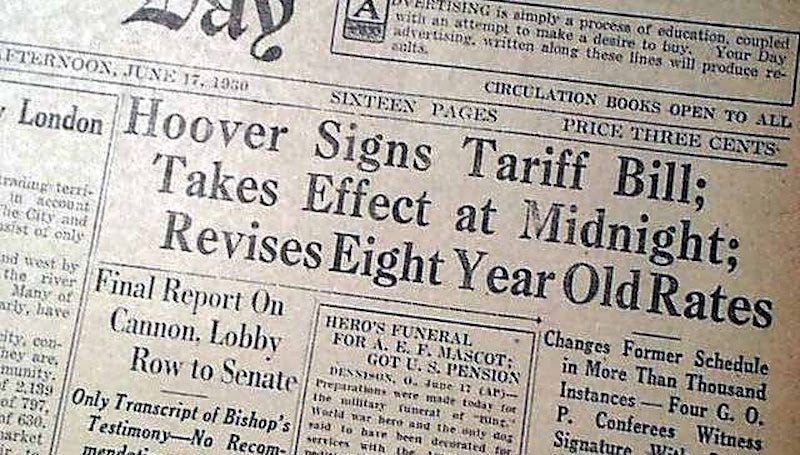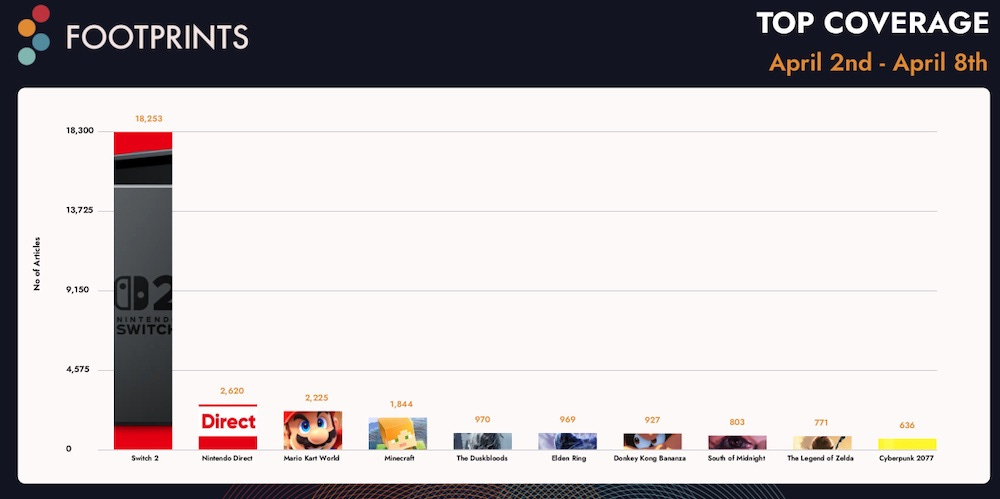Trade wars & the video game biz: the fragmentation risk
Publikováno: 11.4.2025
Let's go beyond the obvious. Also: top Steam releases of the week & lots of news.
[The GameDiscoverCo game discovery newsletter is written by ‘how people find your game’ expert & company founder Simon Carless, and is a regular look at how people discover and buy video games in the 2020s.]
As we glide effortlessly into the week’s end, we’ve only just begun analyzing the fallout from our divided world. Which is why today’s GDCo newsletter has a lead story based around global tariff ramifications that many of us aren’t (yet!) thinking about.
Before we start, a dispatch from VGHF’s Phil Salvador: “Our [Nov. 2008] copy of Men's Fitness [magazine] featuring Take-Two CEO Strauss Zelnick has arrived… and I'm happy to report that it is leagues stupider than I could have imagined. Men's Fitness tried to find the fitness angle on MANHUNT 2.” Uh, stabbing makes for good workouts, maybe?
News: Switch 2 dominates ‘trad media’ of course..
We’ve got quite a concoction of delicacies for you today. So let’s arr our way, piratically speaking, to the captain’s table for grog (and scurvy-beatin’ fruit) all round:
Looking at Footprints.gg’s top ‘trad media’ mentions for April 2nd-8th, wow, there’s some Switch 2 dominance - it had >18k articles, 9x the #2 subject. Of games featured in the Switch 2 reveal, the order of interest was Mario Kart World, The Duskbloods & Elden Ring (FromSoft rules?), then Donkey Kong Bananza.
YouTuber Jon Bringus got a hold of a 2018-era ‘Valve Steambox’ PC, and as The Verge notes: “It… fires up a Steam screen, makes Steam hardware sounds, and natively pairs with Steam Controllers! It appears to have a VirtualLink USB-C port, so it probably helped Valve designers test wired VR headsets before that standard failed.”
The ‘funnily’ named Triple-i Initiative streaming showcase just happened, and here’s a handy list of all the announcements/trailers, including roguelike FPS Void/Breaker, neat-looking sub-zero survival shooter Frostrail, and a June release date confirmation for 11 Bit Studios' mindbending The Alters.
Analyst firm Newzoo released its 2025 PC & console gaming report(free reg. req.), and Game Dev Reports summed up a few of the ‘highlights’, inc. this on players ‘maining’ games: “User attention continues to focus on a [few games] - between 31-34% of players engage with only one to three games annually across platforms.”
The 21st BAFTA Games Awards winners were announced, and “Astro Bot won five BAFTAs: Animation, Audio, Best Game, Family and Game Design; Still Wakes the Deep won three BAFTAs… Helldivers 2 won two BAFTAs, inc. Multiplayer, Thank Goodness You’re Here! won British Game [and] Balatro won Debut Game.”
David Taylor has been looking at ‘freshness’ of top experiences in Roblox vs. Fortnite: “Since I first reported on it in 2022, the average age of a top-10 earning [Roblox] game has decreased from 4.5 years to 2.75 years today.” In contrast, Fortnite’s average - on a younger UGC platform - has been increasing, and is now ~3 years.
Independent investment bank Aream put out a new quarterly ‘state of the biz’ report (.PDF link) which has good background on M&A and trends: “M&A activity in gaming grew to $6.6bn in Q1 2025 – the highest quarterly total in two years… primarily driven by strategic acquirers actively reshaping their portfolios.”
Switch 2 things: Nintendo has indefinitely delayed the release of Switch 2 in China, presumably in part due to lack of gov-approved games; also, correcting an earlier report: “Physical versions of [first-party] Nintendo Switch 2 Edition games will include the original Nintendo Switch game and its upgrade pack all on the same.. card.”
Do you understand Gen Z players? That’s the subject of this Deconstructor Of Fun piece using Google research: “34% of Gen Z plays games primarily to socialize (compared to 26% of other generations). They’re more likely than anyone else to quit or return to a game because of their friends.”
PlayStation news: PlayStation Plus’ Game Catalog for April includes Hogwarts Legacy, the much buzzed-about Blue Prince, the second episode of Lost Records: Bloom & Rage and more; a PlayStation Portal remote player system update added UX enhancements to its key Cloud Game Streaming Beta.
Steam’s libertarian stance has been getting it in trouble in the UK, with (TW: icky stuff) non-consensual, sexually explicit visual novel No Mercy being blocked in the country (and in Australia) due to requests from their governments. (Before the devs removed it entirely, of their own volition.)
Microlinks: Steam’s latest Next Fest video Q&A update is available on YouTube; the ‘not-E3’ timed Xbox Games Showcase 2025 will be livestreamed on Sunday, June 8th; one of the bigger-monetizing Roblox licensed experiences is based on the Warrior Cats novels, and we’re not even joking.
Trade wars & the game biz: the fragmentation risk

You may have heard something about ‘tariffs’ recently. And I think we all understand the basic issues around the U.S. vs. global - and more recently U.S. vs. China - conflict, manifested in collecting fees for physical goods when they enter the country.
This is such a fluid situation that we’re in danger of another shift before we hit ‘send’. But to kick off, let’s just check in on the obvious discussions on Switch 2 hardware, as Bloomberg notes: “Roughly a third of Switch 2 units are assembled in Vietnam - which would’ve been subject to a 46% levy, but now only faces the 10% universal tariff imposed by Donald Trump’s administration.”
So yep, Nintendo can decide to route specifically these consoles to the U.S. for now, - and has already pre-shipped many - which may ameliorate launch issues. This is a short-term fix, though, with tariffs only ‘delayed’. And reportedly, PS5 - which likely has better stockpiles in the U.S. - has more of a China-based manufacturing base.
And let’s not forget, per the NYT: “Wendong Zhang, an assistant professor of applied economics and policy at Cornell University, said 73 percent of smartphones, 78 percent of laptops, 87 percent of video game consoles and 77 percent of toys in the United States come from China.”
So the first layer of the onion for us in the game biz is ‘what’s the Switch 2 launch price in the U.S. and when do pre-orders start?’ Some extra, much more troubling layers are ‘How much will consoles, PCs, and smartphones actually cost in months or years time, if the trade wars continue?’ But, we’d argue, there are far more complex issues beyond that.
Reach the center of this metaphorical onion, and out pops out a little fortune cookie message. Open it, and you’ll read: ‘Trade wars are conflicts between nations which are often part of culture wars.’ And those culture wars are a far more complex proposition.
The first hint of this comes, ironically, alongside the above publicity pic from A Minecraft Movie, via film biz website Deadline:
“The China Film Administration has confirmed that it will reduce the number of U.S. films allowed to enter the country [for theatrical release], hours after Donald Trump imposed record tariffs on Chinese products.
‘The wrong action of the U.S. government to abuse tariffs on China will inevitably further reduce the domestic audience’s favorability towards American films,’ the China Film Administration said in a statement Thursday. ‘We will follow the market rules, respect the audience’s choice, and moderately reduce the number of American films imported.’”
Over in the TV/movie space, my esteemed colleague Entertainment Strategy Guy just posted a pairof articles(partly $) on this, noting: “Virtually everyone is making the same mistake about the coming trade fights, focusing on physical goods, not digital items or services.” And I’d definitely agree - the above move is an emerging example of the latter.
So let’s list some things that might happen in the video game space between the U.S. and China - ignoring the concerns over physical imports & any generalized recessionary issues. Here’s some thoughts:
China could further restrict U.S.-linked games from ISBN approvals: in 2024, the Chinese government officially licensed 1,306 domestic & 110 ‘foreign’ titles for official Chinese operation. Going forward, will U.S.-created games get a fair shot at approval, even at this diminished foreign approval rate?
China could decide to more properly restrict U.S. game platforms in China: we hate to call this one out, but look, Steam is definitely a U.S.-headquartered company. And you do not have to use a VPN to access its client, despite previous semi-blocking and its forums being blocked. Could that change? (Similarly on mobile, if more complex - could something change with Apple’s iOS store?)
The U.S. could restrict China-based companies from owning game firms: the U.S. Department of Defense designated Tencent as a ‘military-linked company’ earlier this year. And as Tencent is the owner of Riot and a big shareholder in Epic, we might want to keep an eye on this too, as things escalate.
The U.S. could take a China-style approach to game approvals: we’d rank this by far as the least likely. But there’s nothing to stop the current U.S. government from trying to say ‘we don’t want the American public to play and give money to games made in China.’ (And enforcing that via U.S. HQs of PC and console game platforms. After all, it’s what China already does, with gray market exceptions.)
There are plenty of other ideas in Entertainment Strategy Guy’s articles that apply to games as well:
additional digital tariffs & taxes, based on the country the creative work was made in. (Could be tracked by where the $ was sent to by the platform.)
changing copyright rules to make it OK to use American IP in foreign countries earlier (or: using it without permission and/or poorly enforcing IP theft.)
One thing significantly in video games’ favor, however, is the transnational nature of how games are made. On Steam, it’s often impossible to even tell where a game was constructed - vs. movies/TV, which are often more ‘culturally American’. (Heck, in games, one of the most obviously American titles has been made in Scotland!)
Finally, while the U.S. and China is the obvious current pain point, it’s theoretically possible that the European Union could also conclude - over time - that some of the Chinese ideas like ‘blocking or fragmenting big U.S. tech platforms to build up local alternatives’ are, in fact, a good idea. At that point, global game stores may get fraught.
Yes, a lot of the above is getting ahead of ourselves. And the global digital nature of the video game biz makes it less susceptible. But in the long-term - many years or even decades - the platform & game fragmentation risk is there. And if platforms are fragmented or tariffed, it will be far more difficult to make successful global games…
This week on Steam: Crashlands 2, Blue Prince go!
Finally, our GameDiscoverCo Plus & Pro subscribers get some analysis of the top debuts of the week on Steam, starting with a trio of titles that have a) done great b) outperformed expectations. Gotta love that…


